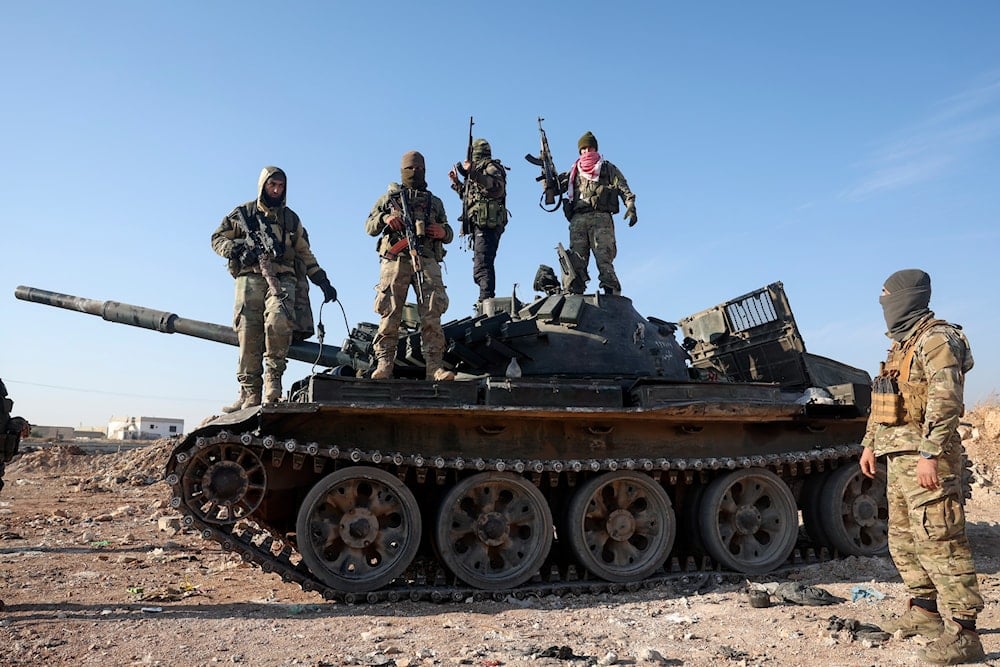New armed groups seeking monopoly emerge in post-Assad Syria: Newsweek
Following the fall of the Assad regime, numerous armed groups have emerged, and the future of the country remains uncertain, as each group vies for monopoly of power.
-

Syrian militants stand atop a seized Syrian army armored vehicle in the outskirts of Hama, Syria, on December 3, 2024. (AP)
The downfall of Syrian President Bashar al-Assad following a rapid armed group offensive marked a dramatic shift in Syria, Newsweek reported on Sunday, adding that while opponents of the ousted government celebrated, the future of the country remains uncertain.
The Newsweek report highlights the uncertainty stemming from expectations surrounding the potential for a successful transitional power under Ahmad al-Sharaa (al-Jolani), the leader of the Hay'at Tahrir al-Sham (HTS) group, amid the emergence of new frontlines.
Internal clashes loom
The report highlights growing concerns about potential conflicts between the armed coalition, the US-backed Syrian Democratic Forces (SDF), and the Kurdish-led group controlling nearly a third of Syria in the north and east. It also notes the presence of the Syrian National Army, backed by Turkiye, which views the SDF as an extension of the Kurdistan Workers' Party (PKK).
According to the report, tensions are particularly escalating over the northern city of Kobani (Ain al-Arab), which was once a symbol of the defeat of SIS advances.
Riad Darar, advisor to the presidency of the SDF's political wing, the Syrian Democratic Council, told Newsweek in a statement that the SDF stronghold along the Syria-Turkiye border will soon "become a turning point" in another critical battle.
Read next: All militant groups to merge under control of new MoD: Al-Sharaa
"I believe there will be violent fighting, the end of which we do not know," Darar said, adding, "We hope the Americans will continue to stand in the face of the attacks and prevent them because this does not serve stability in the region and opens a door that may not be closed in the matter of a political solution in Syria."
Darar also voiced concerns about the direction of HTS rule, stating that despite its friendly slogans, the group has so far been "individualistic" and "does not seek the involvement of the broader Syrian public, politicians, or members of society who endured the injustices and oppression of the previous regime."
He explained that such an approach would lead to the assessment of "the new ruling party as wanting to monopolize power, and this is what all Syrians fear."
Who will fight the Israeli occupation, who won't?
Newsweek referred to the quick Israeli expansion into the Syrian territory, which expanded by land, air, and sea against former Syrian military sites. The Israeli occupation forces also deployed troops to take more control over the occupied Golan Heights.
In a follow-up interview with The New York Times, the leader of the new regime, al-Sharaa, stated that he did "not want any conflict" with "Israel". Meanwhile, his military chief, Abu Hassan al-Hamwi, told Agence France-Presse that the Israeli incursion was "unjust" and urged the international community to "find a solution to this matter."
Others, including the Syrian Socialist Nationalist Party (SSNP), a former ally of Assad's government, have openly called for an armed rebellion against the Israeli occupation, as reported by Newsweek.
US-backed SDF
According to Newsweek, the US, which aided the rebels that first took up arms against Assad in 2011, has relied on the SDF as its main partner in the country.
The Biden administration has confirmed multiple contacts with HTS since the group took control in Damascus. When asked if HTS's designation as a terrorist group might be reconsidered or removed, a US State Department spokesperson told Newsweek, "We do not preview deliberations about terrorist designations or delistings."
East Turkestan Islamic Movement (ETIM)
The Turkestan Islamic Party is associated with the former East Turkestan Islamic Movement (ETIM), which reportedly aims to establish an Islamist state called "East Turkestan" in Xinjiang, China.
In response, Liu Pengyu, spokesperson for the Chinese Embassy in the US, told Newsweek that Beijing "stands ready to step up counterterrorism cooperation with members of the international community to firmly strike down on ETIM and keep the region and the world safe and stable."
Additionally, Liu stressed that Washington's decision to remove ETIM from its Terrorist Exclusion List under Trump in 2020 "has proven that it has politicized and weaponized counterterrorism issue," something "we firmly oppose."
'Turkey holds the key to Syria': Trump
As reported by Newsweek, during a December 16 press conference, Trump expressed his belief that "Turkey is going to hold the key to Syria."
As he prepares to engage with Erdogan once again, the US president-elect described the Turkish leader, who has been in power for two decades, as "somebody I got along great with."
A 2019 agreement between Erdogan and Trump resulted in the US pulling occupation troops from large areas of northern Syria, despite protests from the SDF.
Trump had also supported the full withdrawal of US forces from Syria, where approximately 900 troops are stationed, a force much smaller than Turkiye's "major military force" in the region, as the president-elect recently highlighted, Newsweek said.

 5 Min Read
5 Min Read








